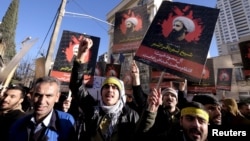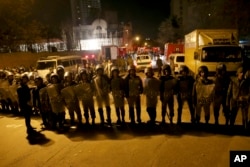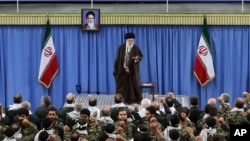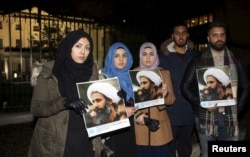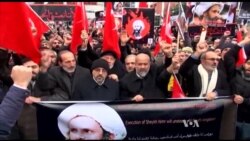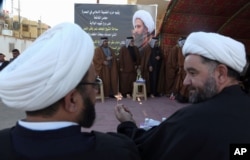Saudi Arabia severed diplomatic ties with Iran less than a day after demonstrators in Tehran stormed the Saudi embassy to protest the Saudi execution of a prominent Shi'ite cleric.
In comments carried by the state-run IRNA news agency, Iranian Deputy Foreign Minister Hossein Amir Abdollahian criticized the move late Sunday, saying Saudi Arabia could not distract from its "big mistake" of executing Sheikh Nimr al-Nimr by cutting ties with Iran.
Saudi Foreign Minister Adel al-Jubeir announced his country's move late Sunday. He said all Iranian diplomats must leave the country within 48 hours and that Sunni-majority Saudi Arabia would not allow Shi'ite dominated Iran to undermine Saudi security.
"The continued attacks on diplomatic missions is a flagrant violation of all international treaties," al-Jubeir said.
He added that Saudi Arabia will not let Iran undermine its security or that of the region.
"We want to make it very clear that there is no space in the community of nations for a country that condones terrorism, that supports terrorism and that engages in terrorism."
The move caps a rapidly worsening diplomatic crisis that erupted Saturday, shortly after Saudi officials announced the execution of Nimr, a prominent Shi'ite critic of Saudi Arabia’s ruling royal family. Nimr, convicted in 2014 of sedition and other charges, was also a key leader in 2011 of Shi'ite protests in eastern Saudi Arabia.
Forty-six others were also executed in the kingdom Saturday, triggering international outrage and warnings of grave repercussions for the Saudi royal family.
The U.S. State Department, in a statement, said Washington "will continue to urge leaders across the region to take affirmative steps to calm tensions." The statement also said the Obama administration believes "that diplomatic engagement and direct conversations remain essential" to resolving the crisis.
Iran threatens 'divine vengeance'
Earlier Sunday, Iran's supreme leader said Saudi Arabia will face "divine vengeance" for its execution of al-Nimr. State television quoted Ayatollah Ali Khamenei as saying, "The unjustly spilled blood of this oppressed martyr will no doubt soon show its effect and divine vengeance will befall Saudi politicians."
He also said Nimr "neither encouraged people into armed action nor secretly conspired for plots, but the only thing he did was utter public criticism rising from his religious zeal."
Angry Iranian protesters on Saturday stormed the Saudi embassy in Tehran and a consulate in Mashhad, smashing furniture and setting fires at the embassy before being ejected by police.
At least 40 protesters were arrested. Iranian President Hassan Rouhani called the attacks on the diplomatic missions "totally unjustifiable," even as he denounced Riyadh's execution of the 56-year-old Shi'ite cleric.
Iran's Revolutionary Guard said in a statement Sunday Nimr's death would lead to the "downfall" of Saudi Arabia's monarchy. The Guard described Nimr's execution as a "medieval act of savagery."
Iraq's Grand Ayatollah Ali al-Sistani called the execution "an injustice and an aggression."
Condemnations, warnings spread
A top Shi'ite cleric in Lebanon also warned of a backlash to Nimr's execution. Sheikh Abdul-Amir Kabalan described the execution as "a crime at a human level [that] will have repercussions in the coming days."
Protests also erupted in Bahrain, where police used tear gas on the crowds. Demonstrations also took place in India, as well as the Saudi embassy in London.
U.N. Secretary-General Ban Ki-moon said he was "deeply dismayed" by the execution of Nimr and called for "calm and restraint in reaction" to the killings.
Watch related video on the Muslim world's reaction by Zlatica Hoke:
Washington warned that Nimr's death would only add to strife between religious sects in the region.
"We are particularly concerned that the execution of prominent Shia cleric and political activist Nimr al-Nimr risks exacerbating sectarian tensions at a time when they urgently need to be reduced," U.S. State Department spokesman John Kirby said in a statement Saturday.
Iran and Saudi Arabia have been vying for leadership in the Muslim world since Iran's 1979 revolution, which elevated to power hardline Shi'ite clerics. The U.S. war in Iraq further inflamed religious and ethnic tensions by leading to a Shi'ite-led government in Baghdad and a crucial shift in the sectarian balance of power in the region.
After Arab Spring protests erupted in 2011, Saudi Arabia and Iran entered into a fierce proxy war in Syria, where they support opposite sides of the conflict. The two foes also back opposing military factions in Yemen, where a Saudi-led coalition has bombed Iran-backed Shi'ite targets for the past nine months.




